Salesforce is the go-to cloud-based customer relationship management (CRM) platform for over 150,000 businesses worldwide. It’s ideal for those with thousands of employees who need all the bells and whistles for their complex operations.
But that kind of setup might not work for everyone. You might get a tank when all you need (well, at least for now) is a reliable car.
If you’re a smaller business, you’ll want a CRM solution that fits your primary needs first. For example, if your company runs on QuickBooks, Method CRM is a better choice as it’s built to directly sync with QuickBooks and has all the key features to hit the ground running.
Here at Method CRM, we’ve been supporting companies that run on QuickBooks since 2010. Method is loved by small and mid-sized businesses across a range of industries for its real-time, two-way QuickBooks sync, no-code customizations, and end-to-end sales automation. In this article, we’ve rounded up the best Salesforce alternatives for businesses of all sizes, with all the details you need to make a comparison. Also, we’ll show how you can make the switch once you find your match for a hassle-free transition. 🙌💯🎯
Table of Contents
What to look for in a Salesforce alternative
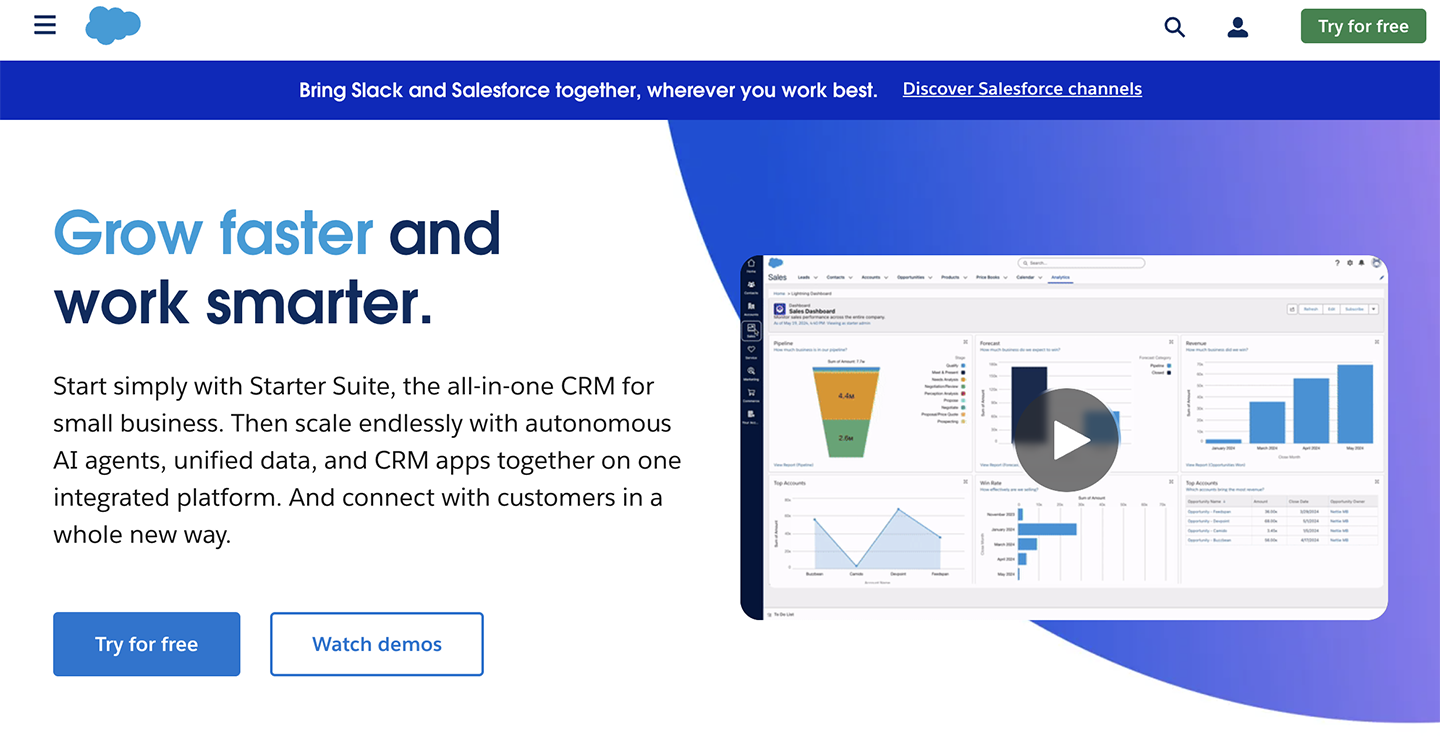
When choosing a Salesforce alternative, look for a platform that brings value and has the features and add-ons that align with how your business runs.
The following features are worth looking into before you make the leap:
Customization and automation ⚙️
Salesforce is powerful, but maybe you don’t need an enterprise-level setup.
Look for a Salesforce alternative with workflow automation catered to your specific needs, like these:
- Method CRM: Keeps it simple with a user-friendly interface that mirrors the way you already work in QuickBooks.
- Creatio: Focuses on advanced automation but lets teams map out complex workflows with drag-and-drop tools.
Pricing transparency and flexibility 💰
Salesforce has tiered pricing that starts simple but quickly increases with add-ons, storage limits, or per-user bumps. Its paid plans start at $25/user/month for the Starter Suite and go up to $100 for the Pro Suite. CRM additions for the Enterprise Edition and above cost extra.
You may want a Salesforce alternative that’s not only cost-effective, but has transparent tiers that don’t lock critical features behind enterprise plans. Certain platforms also offer a free or low-cost starter tier so small teams can get a feel and grow without surprise invoices.
Ease of use and learning curve 👍
Salesforce offers flexibility, but tailoring it to your needs may require developers. Its steep learning curve slows down adoption.
A few alternatives that offer ease of use:
- HubSpot CRM: Drag-and-drop pipelines and a clean layout ideal for marketing teams.
- Insightly: Combines CRM with project tracking, making it useful for service-based teams that want fewer tools to juggle.
Integration ecosystem and apps 👩🏻💻
Salesforce boasts a vast ecosystem, but this can feel like too much for smaller operations. The alternative you choose should have practical apps and integrations that matter to your business.
Some CRMs worth looking at for integrations:
- Method CRM: Has real-time, two-way QuickBooks sync, making it a natural fit for accounting-heavy businesses that rely on accurate financial data.
- Zoho CRM: Connects tightly with the Zoho ecosystem (Zoho Mail, Zoho Books, Zoho Projects).
- Microsoft Dynamics 365: A top choice for companies already living inside Microsoft 365, integrating natively with Outlook, Word, Excel, and Teams.
Scalability and long-term fit 📈
Some lightweight platforms work well at first, but often require an upgrade once your team or customer base expands. Look for systems that scale from small teams to enterprise setups without needing a costly switch.
Choosing a CRM that grows with you saves both money and headaches down the line. Here are a few:
- Odoo CRM: Its open-source structure and modular apps mean that you can start small with just a CRM, then expand into ERP capabilities as your business scales.
- Freshsales: Good for scalability because you can start with the free plan, then layer on advanced features and deeper integrations as your sales process grows more complex.
The best Salesforce alternatives compared (2025 edition)
Get your notepad ready. We’re comparing the best Salesforce alternatives, highlighting their strengths, limitations, pricing, and what type of business they fit.
1. Method CRM
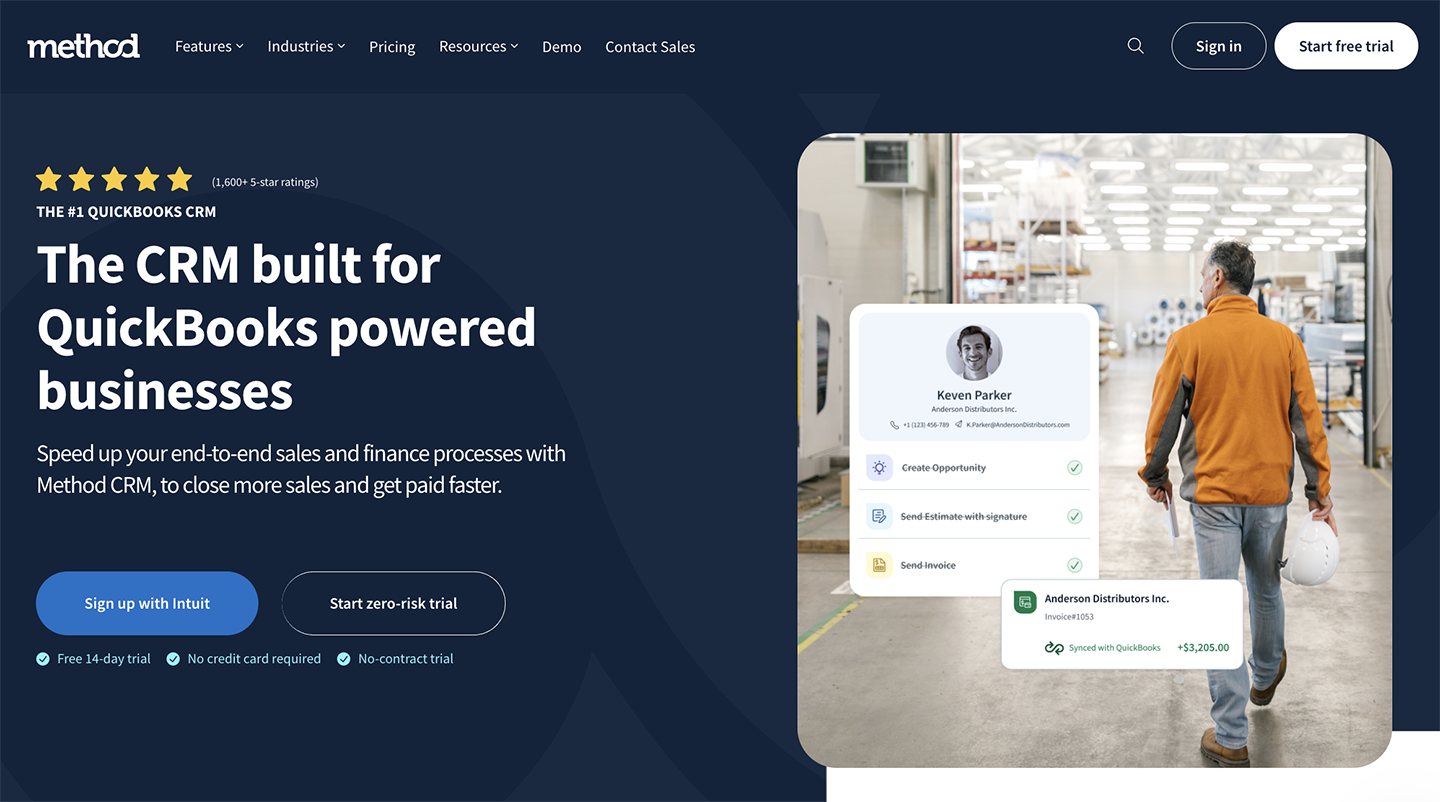
Method CRM is built for businesses that run on QuickBooks. Its real-time two-way QuickBooks sync keeps your financials and CRM perfectly aligned.
Method also includes a customizable online customer portal for self-service, so customers can pay invoices, check transaction history, and send support requests. Even better? These all sync automatically with your accounting.
Who it’s best for:
- Small to mid-sized businesses that live in QuickBooks and need a CRM that adapts to their workflows.
Standout features:
- Best-in-class real-time sync for both QuickBooks Online and Desktop.
- Full CRM functionality with drag-and-drop tools for custom fields, pipelines, and workflows.
- Automation for reminders, follow-ups, and lead tracking tied directly to financial data.
- Integrations with Gmail, Outlook, Mailchimp, Zapier, and more.
Potential limitations:
- Only compatible with businesses using QuickBooks or Xero accounting software.
Pricing:
- Free 14-day trial (includes a setup demo and an hour of customization); Contact Management plan at $27/user/month, CRM Pro at $45/user/month, Enterprise at $73/user/month.
2. HubSpot CRM
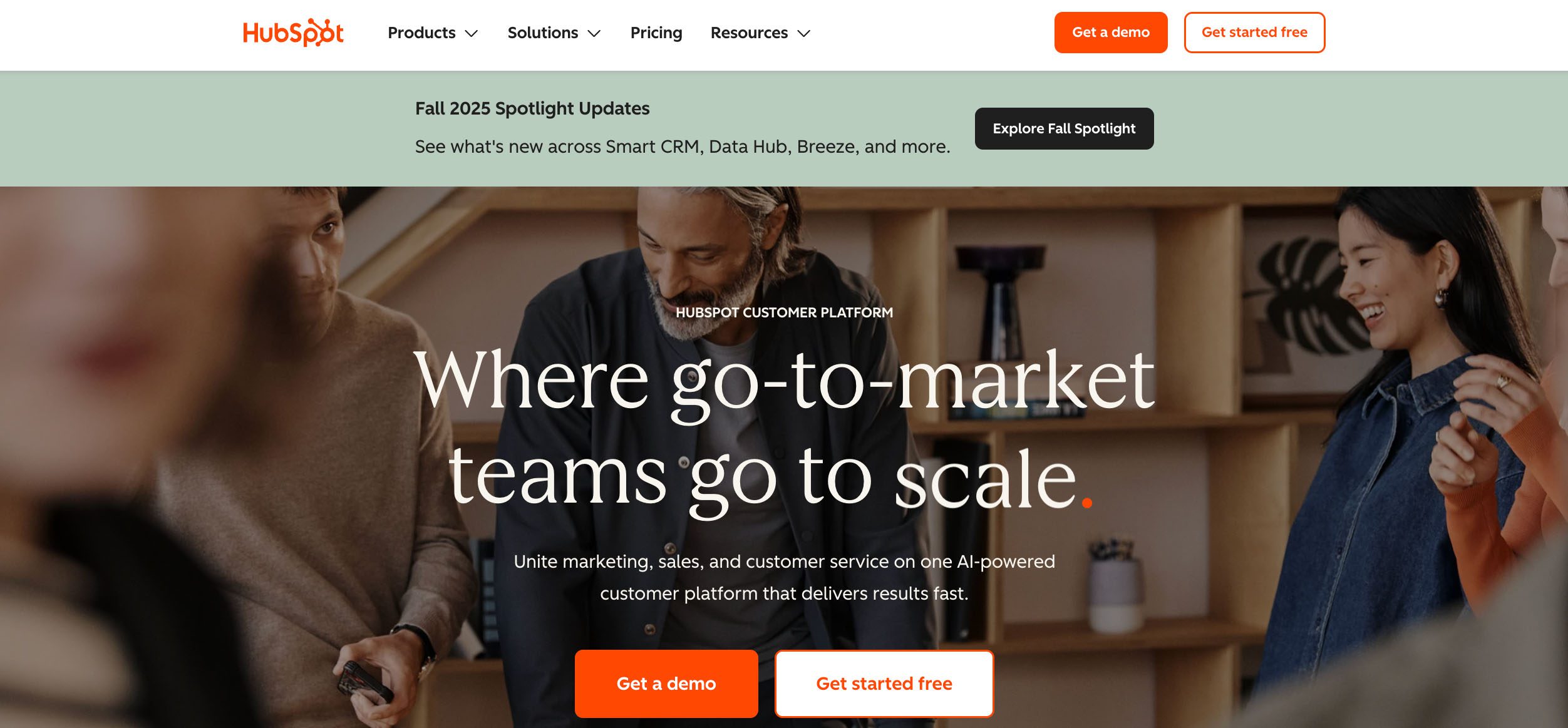
Looking for the most feature-rich free CRM? HubSpot CRM has you covered. It comes with the essential CRM tools, which are enough for most small teams to get started. You can then expand into HubSpot’s paid “hubs” for marketing, sales, and service.
Who it’s best for:
- Small businesses that want a free CRM to start, with room to expand into marketing automation later.
Standout features:
- The free plan includes contact and deal tracking, email templates, live chat, and meeting scheduling for up to two users and 1,000 contacts.
- Includes modular hubs so you only pay for the tools you need.
- AI tools, including Breeze Assistant, for content creation, chatbots, and smart email workflows.
Potential limitations:
- The free tier includes very little customization and no full automation capabilities.
- Pricing jumps quickly as you add seats or grow your contacts list.
Pricing:
- Free plan available; Starter Customer Platform at $9/user/month (paid annually); Professional plan at $1,300/month (paid annually) for up to six users, Enterprise Customer Platform at $4,700/month for up to eight users. Plus add-on costs.
Looking for similar options? Check out HubSpot alternatives here.
3. Zoho CRM

Zoho CRM is part of a bigger ecosystem that covers marketing, support, finance, and project management. This makes it a reliable all-in-one pick for SMBs who want enterprise-ready tools without the enterprise pricing.
Who it’s best for:
- Businesses that want a full-featured CRM now and flexibility to scale through Zoho’s wider app suite.
Standout features:
- Free plan for up to three users with lead, contact, and deal management, plus a mobile app and basic reports.
- Paid plans add workflows, multiple pipelines, lead scoring, and forecasting.
- Integration with Zoho’s 45+ apps (Books for accounting, Campaigns for campaign management, Projects for task management)
Potential limitations:
- The learning curve can be steep, so expect to spend time tailoring it to your workflow.
- May not be the best fit if you rely more on third-party tools instead of Zoho’s own apps.
Pricing:
- Free plan available; Standard at $14/user/month, Professional at $23, Enterprise at $40, and Ultimate at $52.
See our in-depth Method vs Zoho comparison.
4. Microsoft Dynamics 365
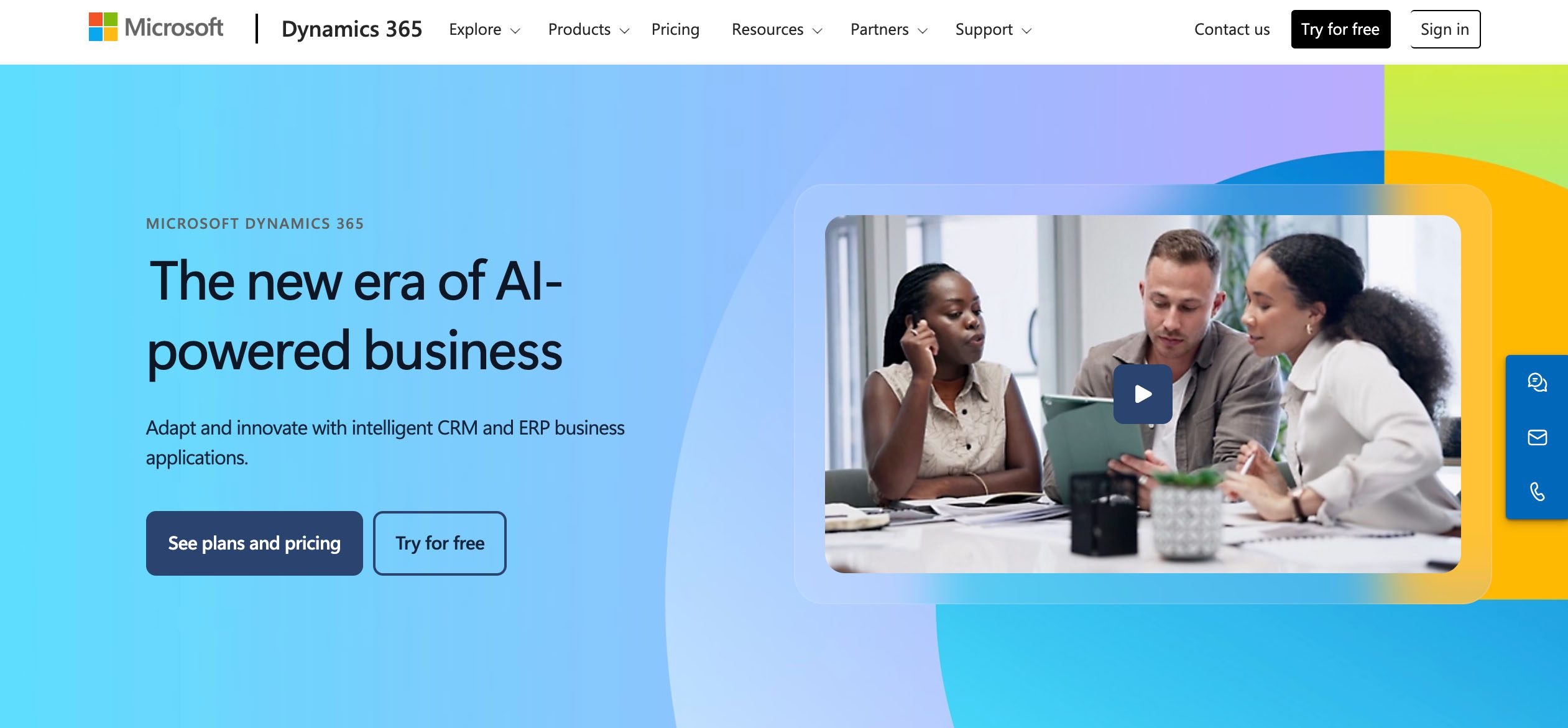
For large organizations that rely on Microsoft apps, Microsoft Dynamics 365 is the way to go. It combines multiple Dynamics 365 CRM modules, giving businesses a unified system to manage customer relationships with AI-assisted insights.
Who it’s best for:
- Large enterprises already using Microsoft tools that need a scalable, extensive CRM with deep reporting and automation.
Standout features:
- Seamless integration with Microsoft 365 apps.
- Advanced AI tools for predictive sales and customer journey analysis.
- Comprehensive sales force automation with contextual insights and reporting.
Potential limitations:
- High upfront and ongoing costs for licenses and implementation.
- Complex implementation and steep learning curve, requiring dedicated resources and training.
Pricing:
- Plans start at $65/user/month for the Sales Professional License, $105 for a Sales Enterprise License, $150 for a Sales Premium License, with additional costs for add-ons like Copilot and Customer Insights.
5. Pipedrive

Pipedrive is a CRM built for sales teams that want to see their pipeline clearly and close deals faster. This sales-focused CRM feature visualizes pipelines to deal stages, activity reminders, and automation tools for lead management, streamlining the sales process.
Who it’s best for:
- Businesses that need an intuitive, actionable view of their sales pipeline.
Standout features:
- Sales automation features like activity reminders, follow-ups, and workflow triggers to keep the business moving.
- Connects with over 400 third-party apps, so it caters to every business need.
- Client data from chatbots, Messenger, web forms, and site visitors is captured and stored directly in the CRM.
Potential limitations:
- Limited customization options for advanced users.
- Customer support varies depending on the subscription plan.
Pricing:
- Paid plans start at $14/user/month for Lite, Growth at $39, Premium at $49, and Ultimate at $79.
Read about the best Pipedrive alternatives for small businesses.
6. Freshsales by Freshworks

Another great sales-focused CRM is Freshsales. What makes this option stand out is that it’s part of Freshworks, giving teams access to a full suite of tools for sales, support, and marketing if needed.
Who it’s best for:
- Sales teams looking for a CRM with AI-powered analytics that simplify decision-making.
Standout features:
- Freddy AI for lead scoring, email suggestions, and deal insights.
- Multi-channel communication (email, phone, and chat) inside the CRM.
- Automate repetitive tasks and set up personalized sales processes.
Potential limitations:
- The entry-level plan supports only one sales pipeline.
- Access to AI tools and extensive customization options are only available in the Pro and Enterprise plans.
Pricing:
- Free plan available; Growth at $9/user/month, Pro at $39, Enterprise at $59.
Here’s a detailed look at Freshsales vs Method CRM.
7. Zendesk Sell
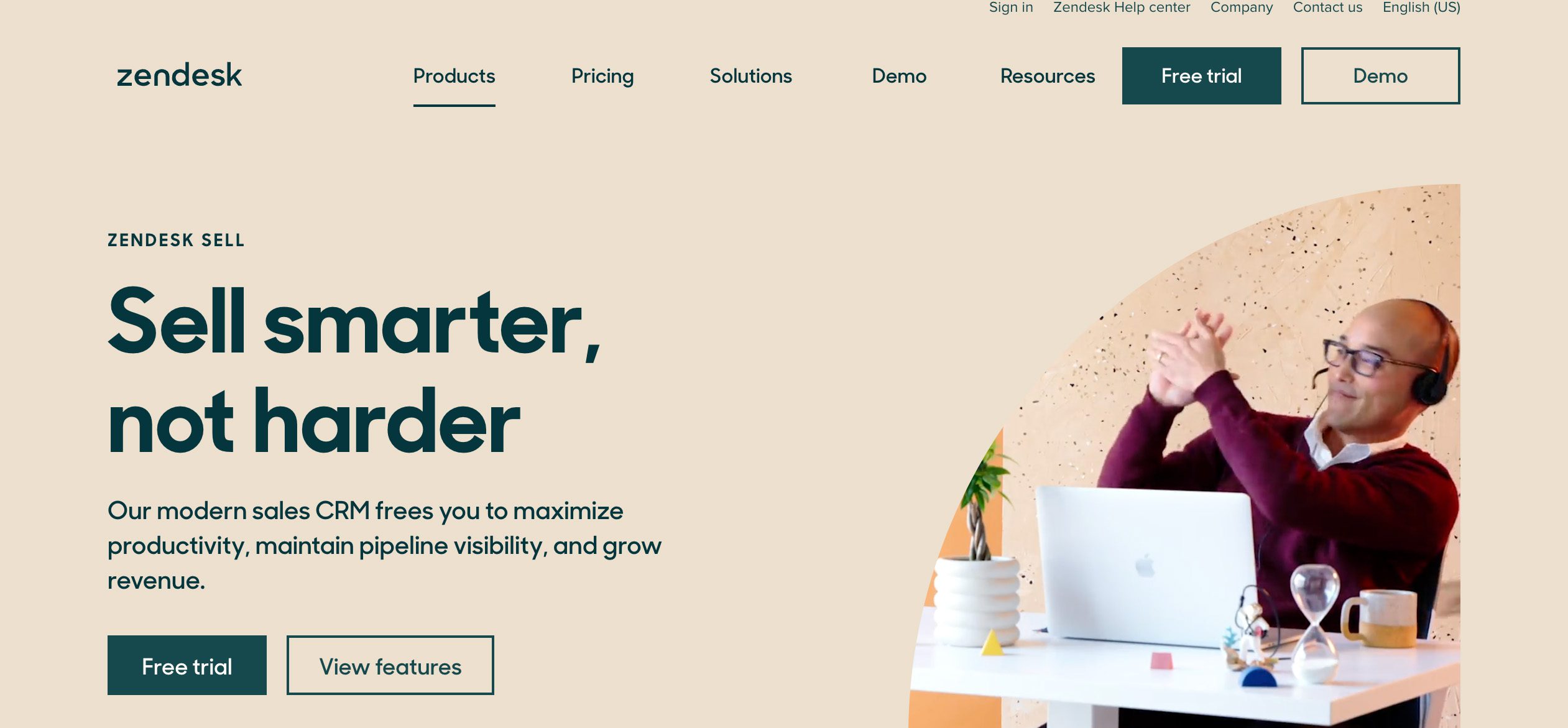
Zendesk Sell is a sales CRM that’s part of the Zendesk family, built to work hand-in-hand with Zendesk’s customer support tools. This integration lets teams have a comprehensive view of customer interactions, so leads, deals, and support requests all live in one place.
Who it’s best for:
- Businesses that require a CRM with integrated customer service and support capabilities.
Standout features:
- Combines sales pipeline management with customer support tools for a cohesive workflow.
- Tailor sales stages to fit specific business processes.
- Access CRM features on the go with a robust mobile app.
Potential limitations:
- Higher-tier plans may be costly for small to mid-sized businesses.
- The number of customizable sales pipelines you can make may feel restrictive.
Pricing:
- Paid plans start at $19/user/month for the Sell Team plan, Growth at $55, Professional at $115, and Enterprise at $169.
Not sold on Zendesk? Check these Zendesk alternatives.
8. Insightly

Insightly is a cloud-based CRM platform that seamlessly combines customer relationship management with project management tools. It’s a popular choice for teams who prefer to manage sales pipelines and project workflows within a single interface.
Who it’s best for:
- Businesses that require both CRM capabilities and project management features.
Standout features:
- Manage customer relationships and project tasks on one platform, reducing the need for multiple tools.
- Wide range of integrations, plus the ability to create custom integrations.
- Gain insights into sales performance and project status with customizable reports and dashboards.
Potential limitations:
- New users may require time to familiarize themselves with the platform’s features and interface.
- Limited AI functionality compared to other options.
Pricing:
- Plus plan at $29/user/month, Professional at $49, and Enterprise at $99.
Curious how it works with QuickBooks? Check out our guide on Method CRM vs Insightly QuickBooks integration.
9. SugarCRM

If you’re a business that needs a CRM moulded to your exact workflows, SugarCRM is for you. It’s a platform known for deep customization, letting you adapt dashboards, modules, and processes to fit your specific needs.
Who it’s best for:
- Businesses that require a highly customizable CRM to match unique workflows, processes, or industry requirements.
Standout features:
- Modify dashboards, forms, and fields with no-code customization.
- With SugarBPM, you get an easy-to-use workflow and business process management (BPM) tool that adds advanced automation.
- The module builder lets you create custom modules with fields and logic to track unique data.
Potential limitations:
- Some setups may require technical expertise or dedicated resources.
- Access to popular third-party integrations (like email and calendar integrations with Google Workspace and Microsoft 365) is limited to higher-tier plans via Sugar Connect.
Pricing:
- Standard plan at $59/user/month, Advanced at $85, and Premier at $135. Each plan requires a minimum of 10 users.
10. Creatio

Creatio is for businesses looking for an easy way to automate workflows. It provides a unified platform where users can build apps and workflows with drag-and-drop tools and pre-built components, all within a flexible, composable framework.
Who it’s best for:
- Businesses aiming to automate workflows using low- or no-code tools.
Standout features:
- Use drag-and-drop tools to design and automate workflows.
- Access a library of reusable components for efficient app development.
- Machine learning (ML) features that monitor and evaluate team performance.
Potential limitations:
- With a large set of features, it’s not beginner-friendly.
- Complex pricing structure that quickly adds up.
Pricing:
- Growth starts at $25/user/month, Enterprise at $55, and Unlimited at $85. Plus add-ons on products, user types, and support.
Note: The minimum purchase for new customers is $10,000 per year. The standard contract term is three years.
Read our guide on the top Creatio competitors and alternatives in 2026.
11. Odoo CRM
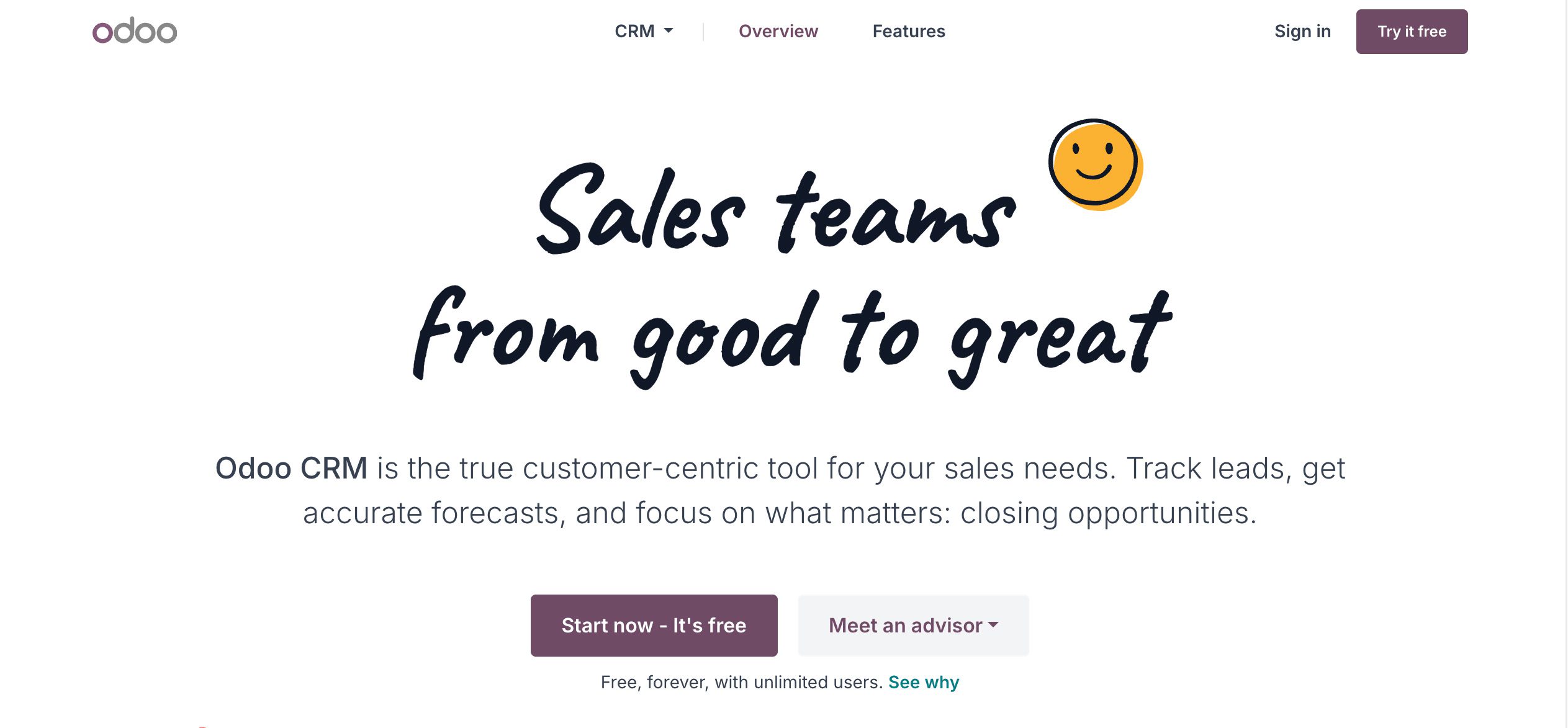
Odoo CRM is for businesses seeking a flexible, open-source platform that integrates seamlessly with a full suite of ERP (Enterprise Resource Planning) apps. It offers an all-in-one solution to manage sales, inventory, accounting, and more.
Who it’s best for:
- Teams needing a CRM that combines open-source flexibility with ERP integration.
Standout features:
- Seamlessly connects CRM with other business applications like sales, inventory, and accounting.
- Works hand-in-hand with Odoo’s suite of apps, covering finance, marketing, sales, supply chain, HR, and more.
- Enables sales teams to access CRM functionalities on the go via the mobile app.
Potential limitations:
- The extensive features may be overwhelming for smaller teams without dedicated IT support.
- Customization and integration with other modules can require significant time and resources.
Pricing:
- Free plan available; Paid plans start at $24.90/user/month for Standard, $37.40 for Custom. Prices if paid annually.
We compared Method CRM vs Odoo to help you find the right fit for your business.
12. SuiteCRM
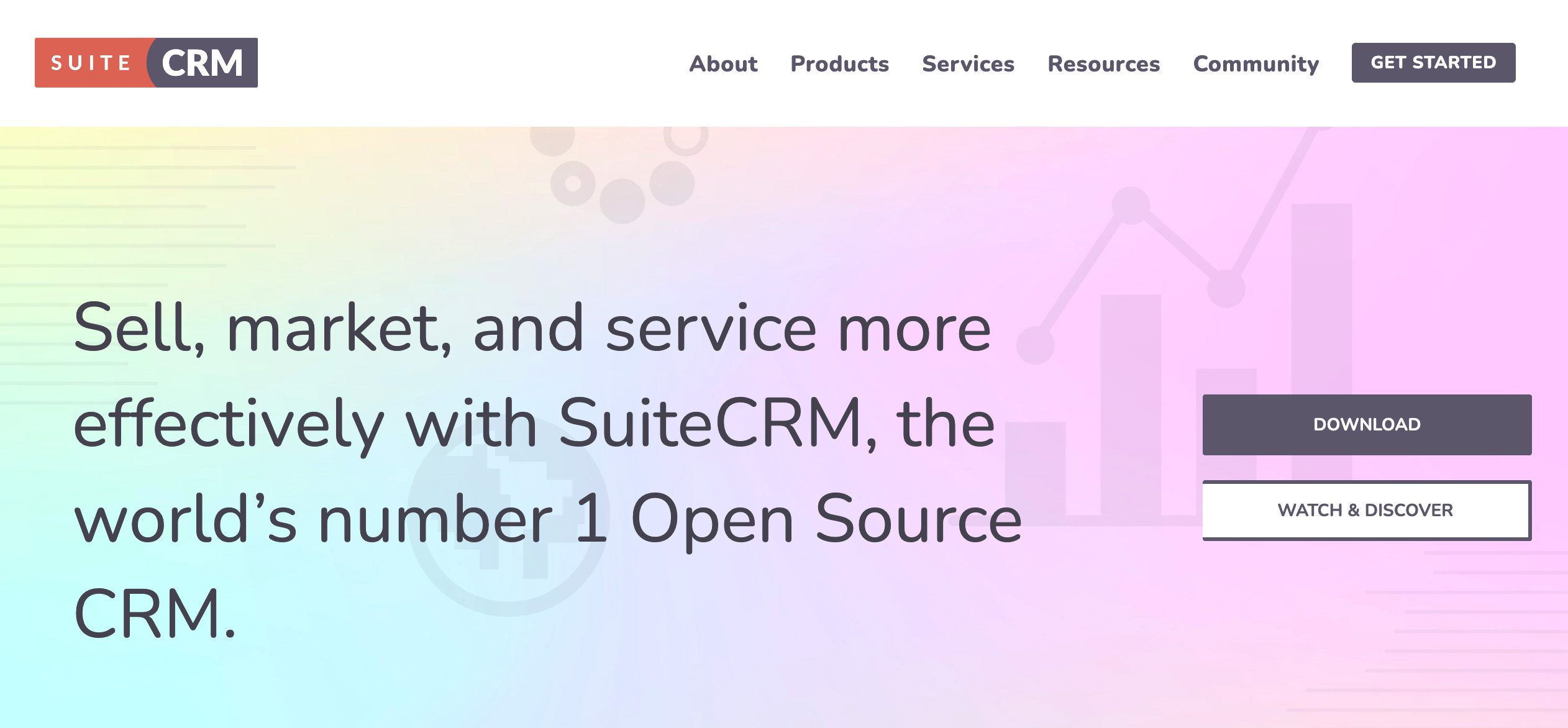
Another open-source CRM platform, SuiteCRM, originated as a fork of SugarCRM’s Community Edition. This means it started from SugarCRM’s open-source code but has since been developed independently. The SuiteCRM team enhanced the original code, added features, and tailored it for a broader audience, creating a distinct product while keeping its SugarCRM roots.
Who it’s best for:
- Businesses looking for a free, open-source CRM with extensive customization options.
Standout features:
- Includes modules for accounts, contacts, opportunities, leads, campaigns, and more.
- Create personalized dashboards to track key performance indicators.
- Access a vibrant community for support, plugins, and extensions.
Potential limitations:
- Primary support comes from the community, and official support requires a paid plan.
- Can be quite complex, particularly when customizing or integrating with other systems.
Pricing:
- Free for unlimited users (self-hosted); Managed hosting plans start at ~$180/month (£130) for up to 10 users.
13. Salesmate
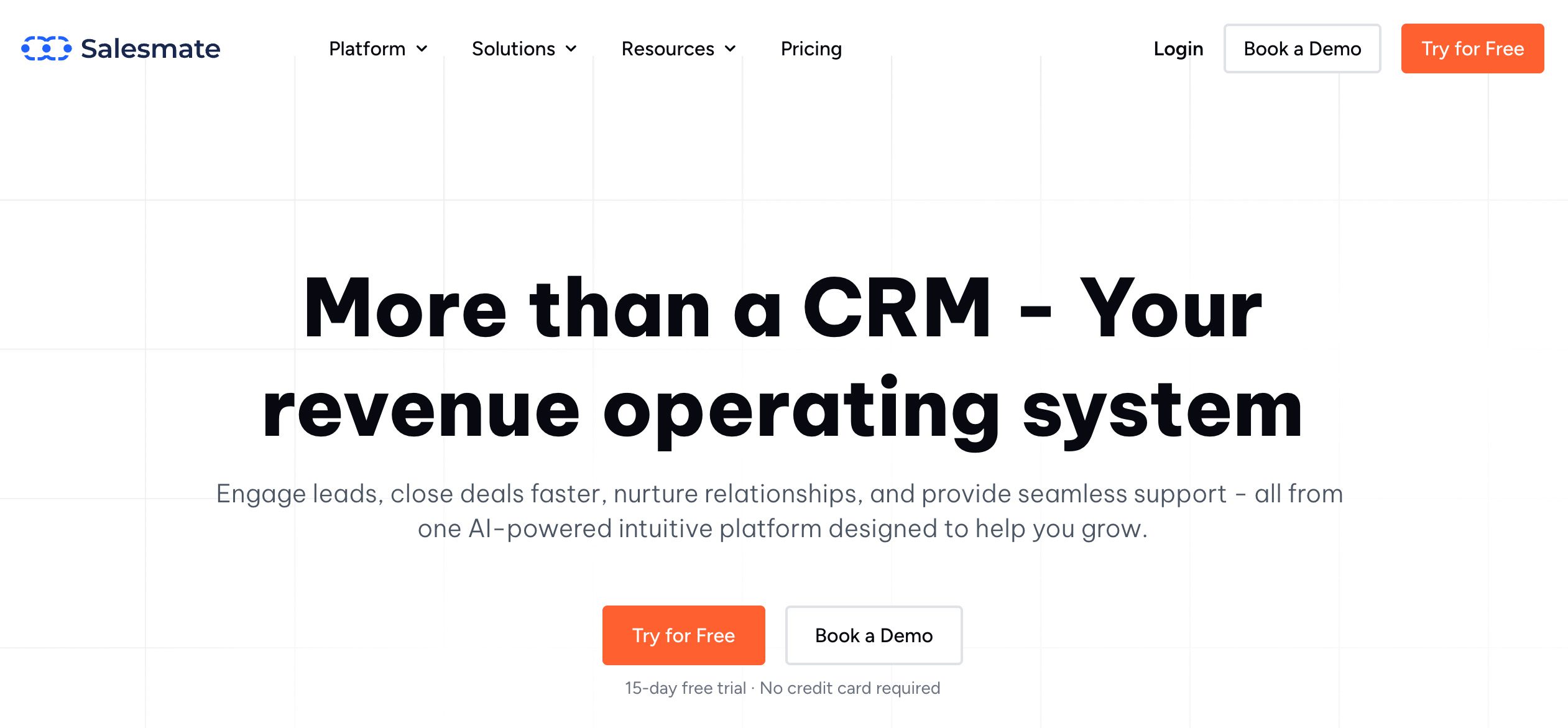
As the name implies, Salesmate is a CRM focused on streamlining sales workflows. Its modern interface helps teams manage leads, track deals, and automate repetitive tasks so sales reps can focus on closing deals instead of chasing data.
Who it’s best for:
- Teams that want an intuitive interface combined with automation for faster deal management.
Standout features:
- Engage with leads via email, SMS, calls, and social media from a single platform.
- Tailor sales pipelines to match your unique business processes.
- Connect with over 700 apps, including Google Workspace, Microsoft 365, and Slack.
Potential limitations:
- Full customization options, such as custom modules and advanced automation, are limited to higher-tier plans.
- The mobile app is lacking, which limits full functionality for on-the-go users.
Pricing:
- The Basic plan starts at $23/user/month, Pro at $39, and Business at $63.
14. ActiveCampaign
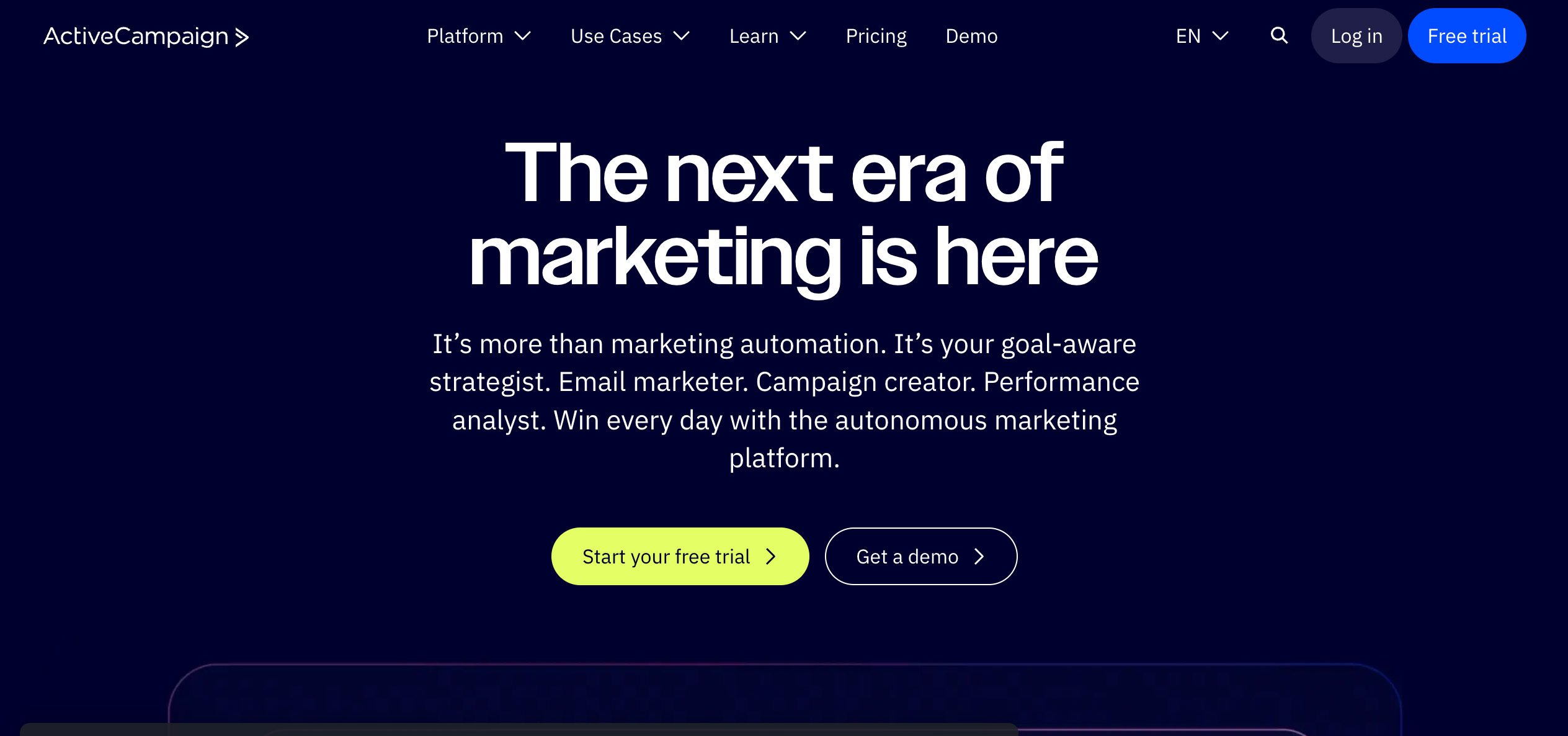
ActiveCampaign combines CRM functionality with advanced marketing automation tools. It’s especially useful for businesses that need automation for follow-ups, customer journeys, and multi-channel campaigns.
Who it’s best for:
- Businesses that want CRM and marketing automation in a single platform.
Standout features:
- Create targeted lists based on customer behaviour and attributes.
- Test different versions of emails and automations to optimize performance.
- Connect with over 900 apps, including Shopify, WordPress, and Salesforce.
Potential limitations:
- Pricing can be higher compared to standalone CRM or email marketing tools.
- Needs third-party tools to send messages outside of email.
Pricing:
- Depends on the number of email contacts and/or Whatsapp contacts. For just email, Starter plan starts at $15/month, Plus at $49, Pro at $79, and Enterprise at $145 (based on 1,000 contacts). Other WhatsApp only and Email and Whatsapp bundles available.
15. Monday.com CRM
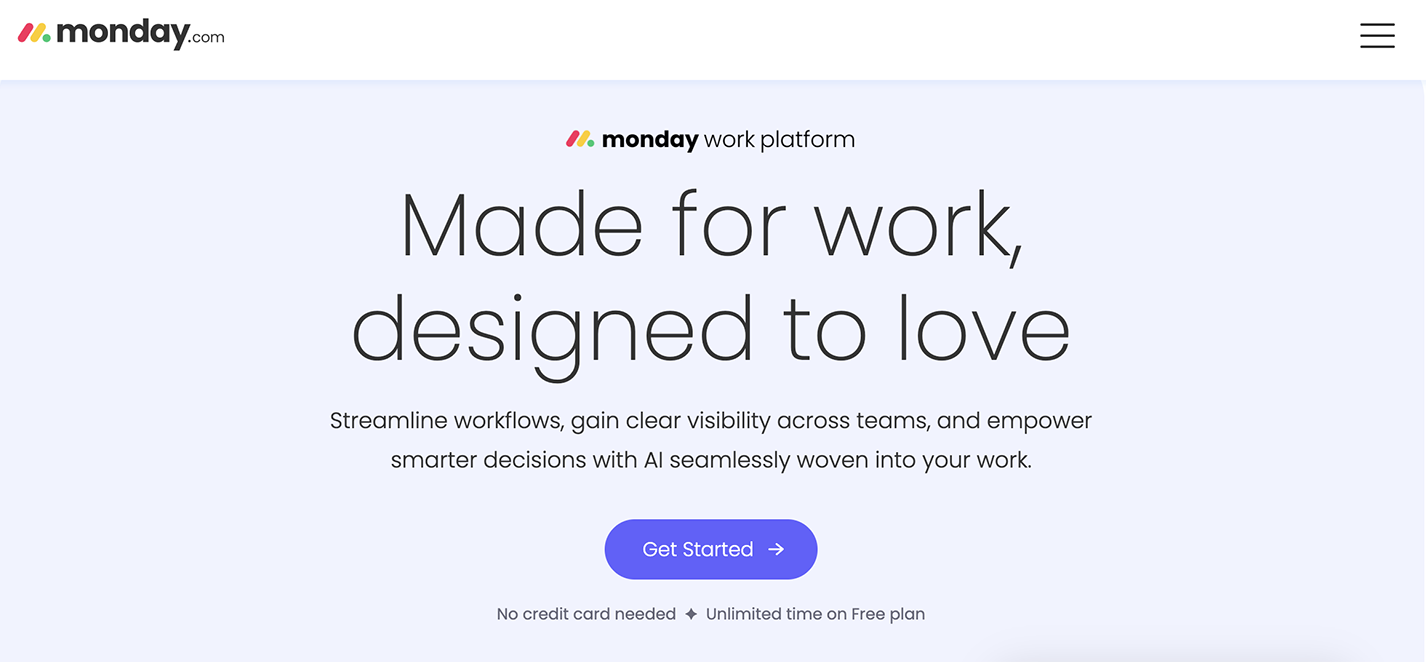
You might have heard of monday.com. This popular customizable platform integrates task management with customer relationship management. Its main feature is the adaptable visual board system that teams can easily customize to organize everything from projects to everyday tasks.
Who it’s best for:
- Businesses that require a highly customizable solution that combines project management and CRM functionalities.
Standout features:
- Track and manage sales with customizable visual boards (Kanban, Gantt, dashboards) and multiple views.
- Facilitate team communication and collaboration with shared boards, updates, and mentions.
- Set up no-code automations to improve efficiency.
Potential limitations:
- There’s a free plan, but it’s very limited (only up to three boards, no integrations and automations).
- The platform’s flexibility may require a learning curve for new users.
Pricing:
- Free plan available (two seats); Basic plan at $12/user/month, Standard at $17, Pro at $28, and custom pricing for Enterprise.
Discover the best monday.com alternatives for your business.
Comparison table: At a glance
Use this table to quickly identify which CRM fits your workflow, sales processes, and accounting needs.
| CRM tool | Starting price | Best suited for | Top features | Native QuickBooks and Xero Integration |
| Method CRM | $27/user/mo | Businesses using QuickBooks or Xero | Automation, workflows, custom pipelines, strong integrations | ✅ |
| HubSpot CRM | $9/user/mo | Businesses wanting a comprehensive free CRM option | Contact/deal tracking, live chat, AI tools, modular hubs | ✅ |
| Zoho CRM | $14/user/mo | SMBs wanting an all-in-one CRM with Zoho app ecosystem | Multiple pipelines, lead scoring, 45+ Zoho app integrations | ✅ |
| Microsoft Dynamics 365 | $65/user/mo | Large enterprises using Microsoft tools | Advanced AI, Microsoft 365 integrations | ❌ |
| Pipedrive | $14/user/mo | Sales-focused teams | Pipeline management, sales automation, activity reminders, integrations | ✅ |
| Freshsales | $9/user/mo | Sales teams wanting AI-powered insights | Freddy AI, multi-channel communication, sales automation | ⚠️ Limited |
| Zendesk Sell | $19/user/mo | Sales teams needing integrated customer support | Sales pipeline + support, mobile app, workflow automation | ⚠️ Limited |
| Insightly | $29/user/mo | Businesses needing CRM + project management | Project and CRM in one, custom integrations, dashboards and reporting | ❌ |
| SugarCRM | $59/user/mo | Businesses needing deep customization | Custom modules, SugarBPM, advanced automation | ❌ |
| Creatio | $25/user/mo | Businesses automating workflows with low/no-code | Reusable components, ML analytics | ❌ |
| Odoo CRM | $24.90/user/mo | Teams wanting open-source CRM + ERP | ERP integration, mobile app, modular apps | ❌ |
| SuiteCRM | Free self-hosted | Businesses wanting free, customizable CRM | Accounts, contacts, opportunities, community support | ❌ |
| Salesmate | $23/user/mo | Startups seeking intuitive UI for sales workflows | Omnichannel engagement, customizable pipelines, 700+ integrations | ⚠️ Limited |
| ActiveCampaign | $15/user/mo | Businesses needing CRM + marketing automation | Contact segmentation, email campaigns, 900+ integrations | ❌ |
| monday.com CRM | $12/user/mo | Businesses wanting visual management + CRM | Visual boards, no-code automations, collaboration tools | ❌ |
As you can see, there’s a wide spectrum of Salesforce alternatives. Deciding comes down to matching features with your priorities.
Why Method CRM is a top Salesforce alternative
Method CRM stands out as a Salesforce alternative, especially for businesses that need seamless QuickBooks integration and a robust platform to manage sales, estimates, proposals, and customer support.
QuickBooks two-way instant sync 🔄
Method offers a real-time, two-way sync with QuickBooks Online and Desktop versions. With this deep level of integration, any updates, whether it’s customer info, invoices, or estimates, show up instantly in both systems.
This cuts out manual data entry, reduces errors, and keeps your accounting in QuickBooks perfectly in sync with your CRM.
Tailored customization with live support 🤝
Method offers no-code customization capabilities and live support to help you build a CRM that works the way you do.
Businesses can work with the Method team to tailor screens, fields, and automation logic to match exactly how your business operates. Customizations include fields, tables, and apps; workflows; web-to-lead forms; online portals, reports, and more.
It’s ideal for small businesses with unique workflows that want to grow with their CRM.
All-in-one platform 💻
With Method, users can manage contacts, create and send estimates, track sales, generate proposals, and provide customer support, all from one place.
The built-in, customizable customer portal lets clients view and pay invoices (businesses can convert approved estimates to invoices in just one click), access transaction history, and submit support requests, with everything automatically syncing to QuickBooks or Xero.
This all-in-one approach streamlines operations, improves team collaboration, and gives a complete view of customer interactions to boost efficiency and deliver a better customer experience.
Transparent pricing per pack 👀
Method offers transparent pricing through its tiered subscription plans, allowing businesses to select the level of functionality that best suits their needs and budget.
This contrasts with Salesforce’s model, where many features and customizations come at an additional cost. For instance, its analytics tool, Tableau, offers reporting capabilities but can range from $15 to $75/user/month on top of your paid plans. Its automation tools, such as MuleSoft Automation, use a credit-based system.
With Method, custom reports and dashboards, workflow automation, and a wide range of other features are included in each plan. No surprise add-ons are required.
How to migrate from Salesforce smoothly
Switching from Salesforce is a big move, but with careful planning, the right tools, and a clear roadmap, your team can transition with ease while keeping customer interactions, workflows, and data intact.
What data to export and keep
Start by identifying the essentials, like contacts, accounts, leads, deals, opportunities, and activity history. Don’t forget notes, tasks, attachments, and custom fields that track key customer interactions.
Export in formats that preserve structure, like CSV or Excel, to make importing more efficient.
Choosing a CRM that supports data import/mapping
Pick a CRM with robust import tools and flexible data mapping. That way, you can ensure that Salesforce fields align with your new system.
To maintain relational integrity, check that the tool supports importing related records, such as linking contacts to accounts or deals to pipelines.
Planning for team onboarding and training
Transitioning teams need structured onboarding. Provide role-specific tutorials, share best practices, such as consistent data entry and standardized pipeline stages, and set up sandbox environments for practice.
Assign internal champions, team members who become CRM experts, to answer questions and support colleagues during the learning curve.
How Method CRM helps transitioning teams
Method CRM streamlines migration with guided data import tools and customizable mapping. If your main concern is transaction data in QuickBooks, you can simply create a new Method account and sync it directly with QuickBooks, minimizing setup time.
Its intuitive interface eases the learning curve, while built-in workflow automation and drag-and-drop pipelines let teams quickly replicate existing processes. Customer interactions, estimates, proposals, and follow-ups are all centralized, so nothing is lost during the transition.
Final thoughts: Picking the right Salesforce alternative
Choosing the best Salesforce alternative isn’t about going for the biggest brand, the cheapest, or the one with the most features. It’s more about finding the right system that supports the way you operate. It should be able to check the boxes of what matters to you, and that could be costs, integrations, flexibility to customize, and more.
Here’s a quick recap of the factors to keep in mind:
- Pricing: Transparent plans that don’t escalate quickly with add-ons.
- Customization: Tools that adapt to your workflows instead of forcing you to adapt.
- Integrations: QuickBooks, Gmail, Slack, and other apps should connect without friction.
- Ease of use: A CRM system your team will actually enjoy using.
If you’re ready for a CRM that finally works the way you do, Method is built for that.
Schedule a free demo today and experience how Method CRM adapts to your business from day one. 🏆🎯✅
Frequently asked questions
Why are companies leaving Salesforce?
Some businesses leave Salesforce because of elevated costs, a steep learning curve, and reliance on add-ons for features like automation, reporting, or integrations. Smaller teams may find it too complex for their day-to-day customer interactions.
How do I choose an alternative to Salesforce CRM?
Start by identifying your priorities, whether that’s pricing, ease of use, customization, or integrations with tools you already use. Look for a platform with a shorter learning curve, solid CRM features that matter to you, and reliable support. Free trials and demos can help you test fit before committing.
What is the best alternative to Salesforce?
The “best” alternative depends on your business needs. For teams that value a real-time two-way QuickBooks sync, customization, and automation without pricey add-ons, Method CRM is a strong choice.
Other popular options include Zoho CRM for businesses already using the Zoho ecosystem, HubSpot for its generous free CRM plan and marketing tools, and Insightly for teams that want CRM and project management in one platform.






